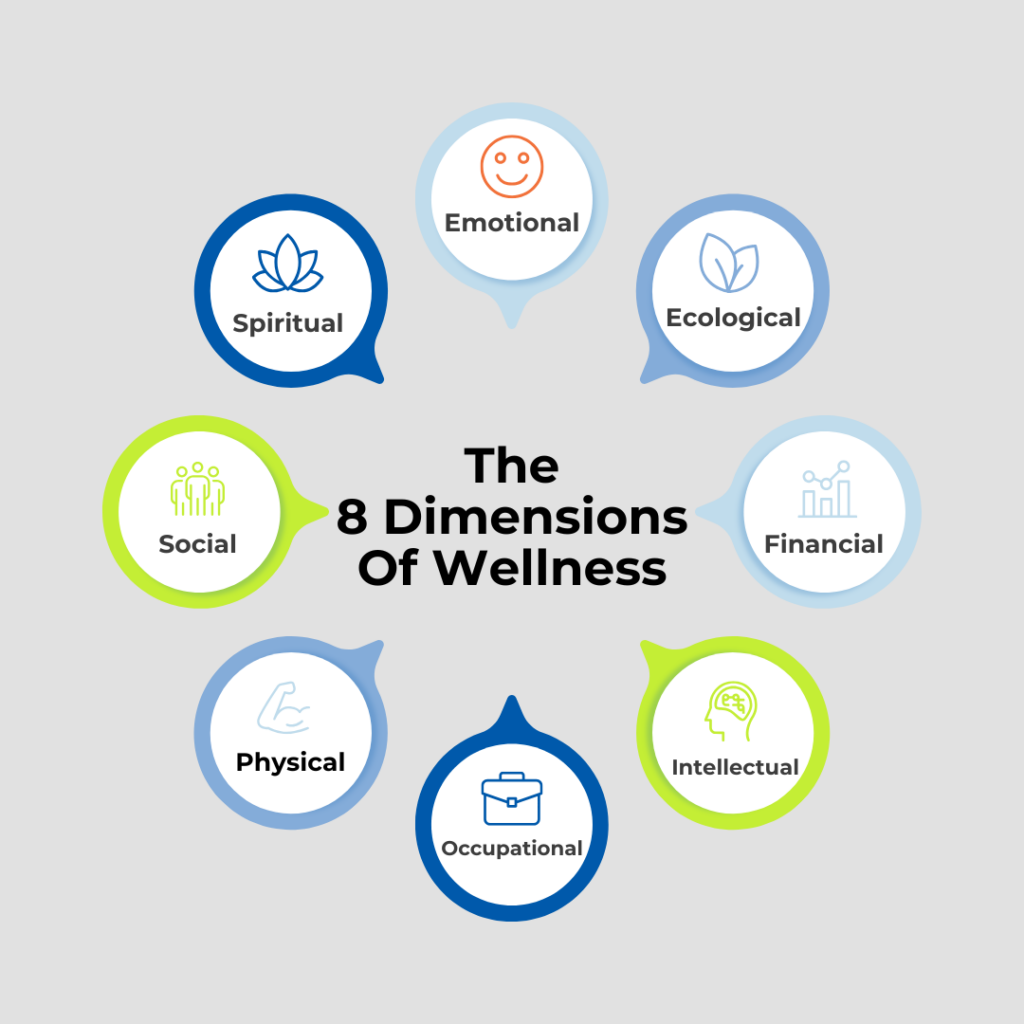The 8 Dimensions of Wellness: A Holistic Approach to a Balanced Life

Achieving a balanced, fulfilling life requires more than just physical health—it involves nurturing multiple aspects of our well-being. The 8 Dimensions of Wellness provide a comprehensive framework for achieving balance and living a healthy life. Each dimension interconnects and plays a crucial role in your overall wellness, helping you thrive mentally, emotionally, socially, and physically. In this blog post, we’ll explore each of the 8 Dimensions of Wellness and discuss how you can cultivate them to live a more fulfilling and balanced life.
1. Occupational Wellness: Finding Purpose and Satisfaction in Work
Occupational wellness refers to the personal satisfaction and enrichment you experience through your work. It’s not just about earning a paycheck but also finding meaning, purpose, and fulfillment in what you do. Whether you’re passionate about your career, pursuing a hobby as a side job, or volunteering, your work should contribute to your overall sense of well-being.
How to enhance occupational wellness:
- Align your work with your values and passions.
- Set achievable career goals and celebrate milestones.
- Create a healthy work-life balance to avoid burnout.
- Seek opportunities for professional growth and development.
- Find purpose in how your work impacts others or contributes to a greater cause.
When you find fulfillment in your work, it positively impacts other areas of your life, such as emotional, financial, and social wellness.
2. Emotional Wellness: Managing Emotions and Cultivating Resilience
Emotional wellness is all about understanding, managing, and expressing your emotions in a healthy and constructive way. It involves being in tune with your feelings and using emotional awareness to cope with life’s challenges. Practicing emotional wellness also means cultivating resilience, so you can bounce back from difficult situations and maintain mental balance.
How to enhance emotional wellness:
- Practice mindfulness and emotional awareness.
- Cultivate healthy coping mechanisms, such as journaling or talking to a trusted friend.
- Set boundaries to protect your emotional well-being.
- Seek therapy or counseling when needed to address unresolved emotions.
- Engage in activities that promote joy and relaxation, such as meditation or spending time with loved ones.
By managing your emotions effectively, you create a solid foundation for other areas of wellness, including your relationships and mental health.
3. Ecological Wellness: Living in Harmony with the Environment
Ecological wellness, also known as environmental wellness, refers to living in a way that contributes to the health of the planet and all living creatures. It involves being mindful of your environmental impact, whether it’s reducing waste, conserving resources, or making sustainable choices in your daily life. A healthy environment promotes a healthier lifestyle for individuals, families, and communities.
How to enhance ecological wellness:
- Reduce, reuse, and recycle whenever possible.
- Adopt sustainable habits, such as reducing plastic usage or supporting eco-friendly companies.
- Spend time outdoors and enjoy the natural world.
- Educate yourself on environmental issues and take action to support causes you care about.
- Create an eco-friendly home by making small changes, like energy-efficient lighting or reducing water waste.
Living in harmony with the environment enhances your physical and mental well-being, creating a sense of responsibility and connection with the earth.
4. Spiritual Wellness: Finding Purpose and Connection
Spiritual wellness is the process of seeking meaning and purpose in life through a connection to something greater than yourself. This could involve religious beliefs, personal values, or a sense of connection to nature, the universe, or humanity. Spiritual wellness helps you navigate life’s challenges, find inner peace, and develop a sense of purpose.
How to enhance spiritual wellness:
- Reflect on your personal values and beliefs.
- Practice meditation, prayer, or mindfulness to cultivate inner peace.
- Connect with a community that shares your spiritual values.
- Engage in activities that inspire you, such as reading, art, or volunteering.
- Spend time in nature to foster a sense of connection and awe.
Spiritual wellness can provide a deeper sense of meaning in life and offer the strength and guidance you need to face challenges with grace.
5. Financial Wellness: Achieving Financial Security and Stability
Financial wellness refers to your ability to manage your finances in a way that reduces stress and supports a comfortable and secure lifestyle. It involves budgeting, saving, and planning for both short-term and long-term goals. Financial wellness also includes understanding your relationship with money and developing a healthy attitude toward spending, saving, and investing.
How to enhance financial wellness:
- Create and stick to a realistic budget.
- Build an emergency fund for unexpected expenses.
- Pay off high-interest debt to reduce financial stress.
- Set financial goals, such as saving for retirement or buying a home.
- Seek financial advice or education to improve your financial literacy.
Financial wellness is not just about making money—it’s about managing what you have in a way that aligns with your goals and reduces financial stress.
6. Social Wellness: Building Strong Relationships and Connections
Social wellness involves developing healthy, supportive relationships with others. It’s about creating a strong social network that provides emotional support, companionship, and a sense of belonging. Healthy relationships contribute to your emotional and mental health, while positive social interactions help foster a sense of happiness and connection.
How to enhance social wellness:
- Cultivate meaningful friendships and stay connected with loved ones.
- Join groups or clubs that align with your interests.
- Engage in acts of kindness to foster positive relationships.
- Communicate openly and honestly with those close to you.
- Seek social support when you need it and offer support to others.
Social wellness is a key factor in improving your emotional well-being, reducing stress, and increasing overall happiness.
7. Intellectual Wellness: Stimulating the Mind and Pursuing Growth
Intellectual wellness is about keeping your mind sharp, engaged, and curious. It involves lifelong learning, challenging yourself to think critically, and exposing yourself to new ideas and perspectives. Intellectual wellness can come from formal education, reading, engaging in stimulating conversations, or pursuing hobbies that challenge your mind.
How to enhance intellectual wellness:
- Read books, articles, or watch documentaries on topics that interest you.
- Take up new hobbies or learn new skills.
- Engage in debates or discussions to expand your perspectives.
- Solve puzzles, play strategy games, or practice problem-solving.
- Attend workshops, classes, or lectures to keep learning.
Intellectual wellness promotes cognitive health and keeps you mentally engaged and adaptable throughout life.
8. Physical Wellness: Caring for Your Body Through Exercise and Nutrition
Physical wellness is about maintaining a healthy body through exercise, nutrition, and self-care. It involves taking care of your physical health to improve your overall well-being and quality of life. A healthy body provides the energy and strength needed to navigate daily life and thrive in all other areas of wellness.
How to enhance physical wellness:
- Engage in regular physical activity, such as walking, running, or yoga.
- Eat a balanced, nutritious diet rich in whole foods.
- Prioritize sleep and rest to allow your body to recover.
- Stay hydrated to keep your body functioning properly.
- Visit healthcare providers regularly for check-ups and preventive care.
Physical wellness is the foundation for many of the other dimensions, supporting your emotional, social, and intellectual health.
Integrating the 8 Dimensions of Wellness into Your Life
The 8 Dimensions of Wellness offer a holistic framework to help you create a balanced, fulfilling life. By nurturing each dimension—occupational, emotional, ecological, spiritual, financial, social, intellectual, and physical—you can achieve a sense of well-being that goes beyond physical health. It’s about developing a life that integrates all aspects of who you are, creating harmony and balance.
By making small changes and focusing on these dimensions, you can begin to live a life that is truly in alignment with your values, goals, and well-being. Embrace the journey of wellness and create a balanced life that empowers you to be your best self.
